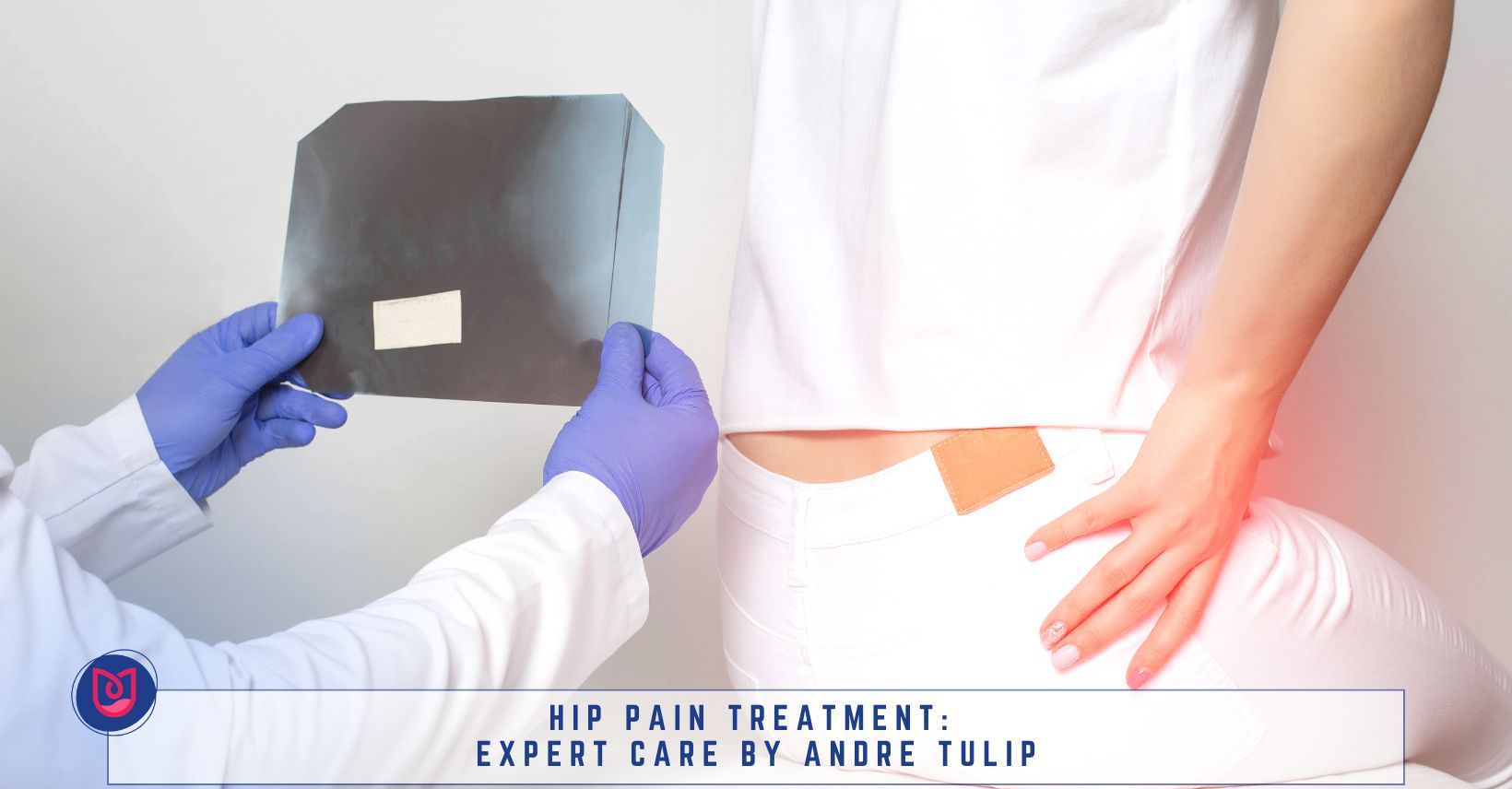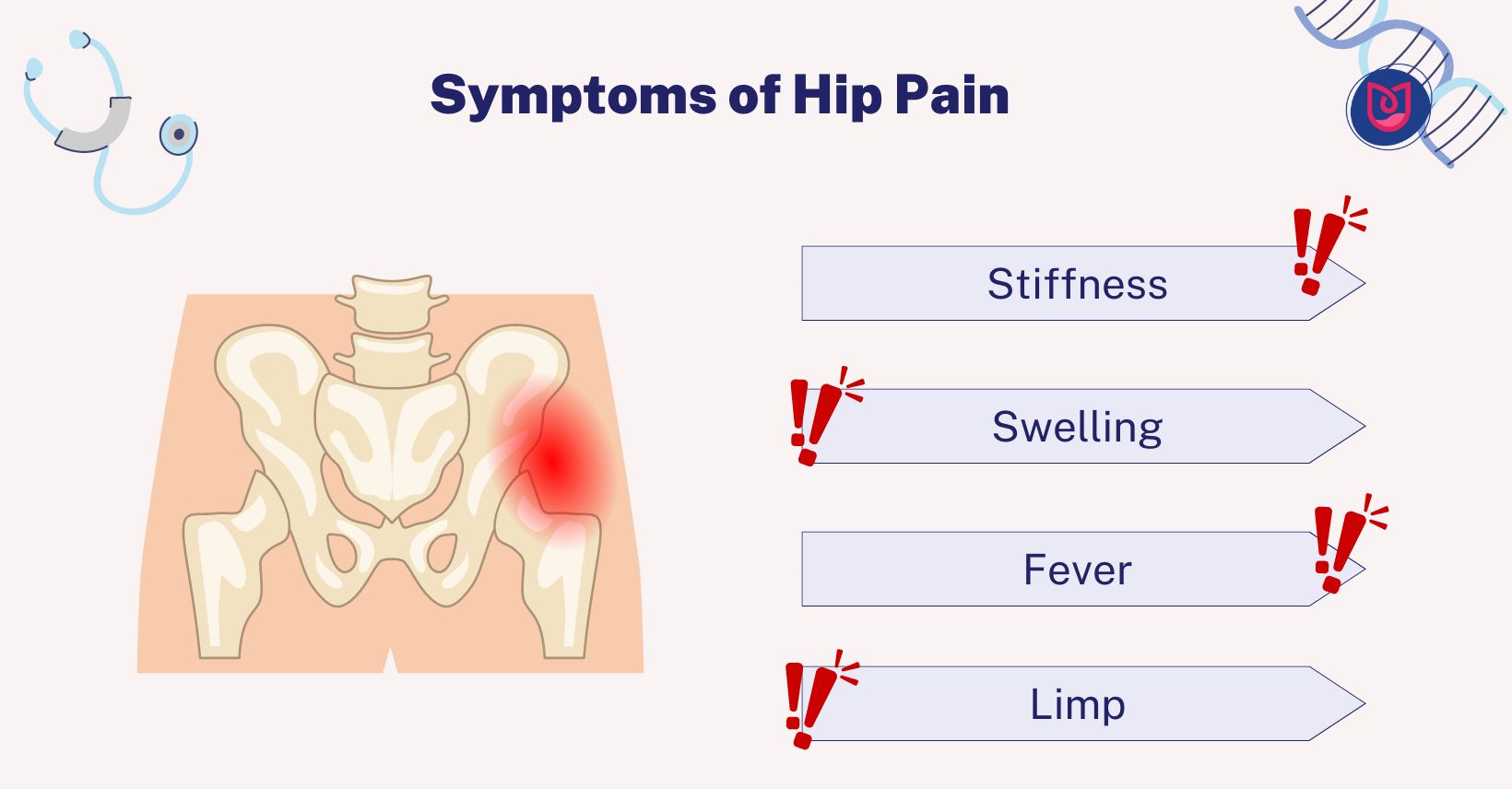
Battling hip pain can be challenging, but help is at hand. Explore the causes, identify the symptoms, and consider a variety of effective treatments.
Find out why numerous individuals choose Andre Tulip, a foremost expert in hip pain relief. See how his specialised care can restore mobility and enable you to enjoy a pain-free life.
Prepare to regain your freedom of movement with assurance!
Understanding Hip Pain
Understanding hip pain requires insight into the hip joint’s complex structure, including bones, cartilage, and soft tissues. It also requires recognising conditions such as inflammation or injury that can cause discomfort. This comprehensive understanding helps diagnose and treat the pain effectively, leading us to explore the various causes behind hip discomfort.
What Causes Hip Pain?
Hip pain arises from various conditions, such as osteoarthritis, rheumatoid arthritis, hip labral tear, and sports injuries. Osteoarthritis involves degenerative changes, where the cartilage cushioning the bones wears away, leading to pain and stiffness. Rheumatoid arthritis, an autoimmune disease, causes joint lining inflammation, affecting the hip and potentially other joints. Sports injuries can lead to fractures, dislocations, and soft tissue damage due to direct trauma or repetitive stress. These causes contribute to various symptoms that affect mobility and quality of life.
What Are the Symptoms of Hip Pain?

Symptoms of hip pain include pain, stiffness, swelling, and sometimes a limp or fever, which can impact daily activities and mobility. The pain’s nature can vary; it might be dull and aching in osteoarthritis or sharp and intense in conditions like bursitis. Severe conditions like hip fractures can cause intense pain and swelling, making weight-bearing difficult. These symptoms necessitate experts to accurately diagnose and effectively treat the underlying causes of hip pain.
Why Is It Important to Consult a Physiotherapist for Treating Hip Pain?
Seeking the expertise of a physiotherapist for hip pain ensures a professional assessment and development of a customised treatment strategy. Physiotherapists, skilled in determining the precise causes of hip pain, apply non-surgical methods that target pain relief and functional improvement. Their ability to enhance joint function through tailored exercises and manual therapy makes them integral to managing hip discomfort effectively.
What Are the Treatment Options Offered by Andre Tulip?
At Physio Sunderland, Andre Tulip offers comprehensive treatment options for hip pain, including therapy and rehabilitation programmes to enhance muscle strength, flexibility, and mobility. These programmes incorporate advanced techniques like manual therapy, ultrasound, or electrical stimulation to optimise recovery and ensure effective treatment outcomes, positioning Andre Tulip as a preferred specialist for managing hip pain.
Why Choose Andre Tulip for Hip Pain Treatment?
Choosing Andre Tulip for hip pain treatment ensures access to his extensive expertise and the advanced facilities at Physio Sunderland. With a focus on personalised care, Andre Tulip offers innovative treatment modalities and rehabilitation tools that foster quick recovery, long-term relief, and preventive care to enhance overall wellness and quality of life.
How to Schedule an Appointment with Andre Tulip
Scheduling an appointment with Andre Tulip at Physio Sunderland is straightforward, ensuring timely and effective care for hip pain. Contact the clinic via phone or use the online booking system to find a convenient time. During your initial consultation, expect a thorough assessment and a personalised treatment plan based on your medical history and symptoms, enhancing your path to recovery and improved hip functionality.
Frequently Asked Questions
How do I get my hips to stop hurting?
Regular low-impact exercises like swimming, cycling, and yoga strengthen hip and core muscles and reduce joint stress to alleviate hip pain. Managing weight through a balanced, nutrient-rich diet helps lessen joint strain and inflammation. For pain relief, consult a healthcare provider to explore treatments such as over-the-counter medications, physical therapy, or corticosteroid injections. Individuals with hip dysplasia should avoid high-impact activities and use supportive devices to minimise hip strain.
What not to do with hip pain?
Avoid activities that exacerbate hip pain, such as strenuous exercise and ignoring referred pain, which might signal deeper issues. High-impact activities, twisting movements, and prolonged poor sitting posture can worsen hip discomfort. Allow time for the hip to heal by resting adequately, which helps reduce ongoing inflammation and damage.
Is it better to rest or exercise when you have hip pain?
Balancing rest and exercise is essential for managing hip pain. Rest reduces inflammation, while moderate exercises like stretching and swimming enhance joint flexibility and muscle strength. Adjust exercise intensity and duration according to your health status, gradually increasing as your condition improves.
Can sitting too much cause hip pain?
Prolonged sitting can lead to hip pain due to stiffness and inflammation, exacerbated by poor posture. To mitigate these effects, take regular breaks to move and stretch, maintaining mobility in the hip joint. Ensure good sitting posture to decrease pressure on the hip and prevent further discomfort.
What painkillers are good for hip pain?
For hip pain, common painkillers include nonsteroidal anti-inflammatory drugs (NSAIDs) and paracetamol, which reduce inflammation and block pain signals, respectively. For severe pain, opioids may be prescribed. Always consult a healthcare provider before starting any pain medication to avoid side effects and ensure appropriate use.